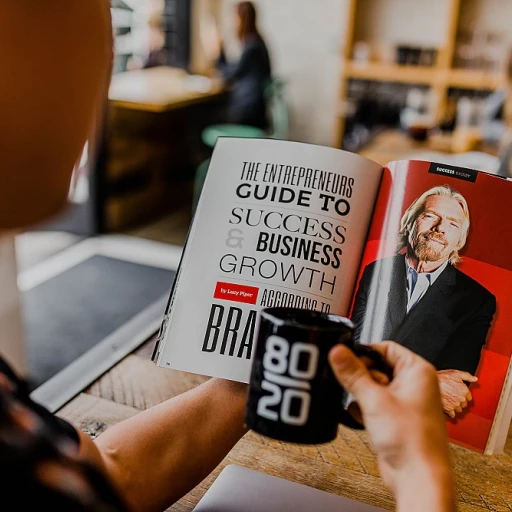Understanding the Core of the '7 Habits'
Unlocking the Habits of Effective Leadership
Understanding the core principles of leadership through the '7 Habits' guide can serve as a catalyst for personal and professional growth. This transformative approach has been recognized for its profound impact, and it's highly recommended for those intending to excel in leadership roles.
To harness the power of these habits, one must delve deeper into what makes them effective for people in leadership positions. Each habit builds upon the notion of nurturing a proactive mindset, emphasizing the importance of paradigms that influence, not just change, but life itself. Understanding the habits involves acknowledging how they align with personal values and the shifts required for highly effective leadership.
The essence of the '7 Habits' guide lies in a structured methodology that intertwines with the fabric of one's circle of influence and concern. It paves the way for a more disciplined approach to leadership through time management and prioritization of activities. These habits are more than just a set of rules, they are a prism through which highly effective people see the world.
Covey’s work emphasizes empathic listening and seeking to understand before being understood, which are essential for building trust and effective communication. Recognizing the 'emotional bank account' metaphor assists in appreciating the delicate balance of giving and receiving in professional relationships.
To delve more deeply into how these principles can shape your leadership journey, explore the nuances of each habit, including its impact on win-win paradigms and personal mission statements. A foundational understanding of these concepts is crucial for anyone aiming to thrive as an effective leader. For a broader understanding, check this insightful guide on how your attitude shapes your leadership journey
here.
Habit 1: Be Proactive in Leadership
Proactive Leadership for Enduring Influence
Being proactive is more than just taking the initiative. It's about recognizing the power of your choices in the face of circumstances. This concept, deeply embedded in the '7 Habits' guide, shapes our interaction with both the circle of concern and the circle of influence. By focusing on what can be controlled or influenced, highly effective people direct their energy towards productive engagement, fostering personal and professional growth.
Proactivity is not limited to decision-making; it also involves the understanding that our responses shape our experiences. A proactive leader maintains a positive emotional bank account, enriched through consistent, constructive interaction with team members. Their ability to respond thoughtfully, rather than react impulsively, demonstrates emotional intelligence that resonates in business and beyond.
Implementing this habit requires a paradigm shift toward responsibility, transforming challenges into opportunities. Effective people approach every situation—whether a routine task or urgent activities—with a mindset geared towards solution-oriented outcomes. By embracing this proactive stance, they position themselves to exercise influence rather than succumb to external factors.
To delve deeper into actionable strategies for enhancing your leadership qualities, consider exploring
effective words to describe leadership qualities that can transform your understanding and implementation of proactive leadership. Such exploration can result in an enriched personal mission, aligning values with day-to-day actions, a cornerstone of enduring leadership development.
Habit 2: Begin with the End in Mind
Prioritizing Key Initiatives
Building on the understanding of the core principles associated with highly effective people, developing leadership potential requires mastering the ability to prioritize. The essence of "Put First Things First" in leadership involves discernment in how one allocates time and resources. This discipline is reflected in effective people through sharp time management and an acute awareness of distinguishing between activities urgent and activities important.
One's circle influence plays a pivotal role here. Knowing where to invest energy can make a difference in both personal and professional contexts. Leaders who consistently renew habit after habit learn to identify and manage the various activities urgent, yet they remain focused on their personal mission and life values.
A fundamental paradigm shift often required is moving from impulsivity, reacting to every task that seems pressing, to being guided by a personal mission statement. Prioritization shouldn't be dictated by incoming pressures but by values that govern effective leadership. Indeed, this leadership habit underscores the importance of intentional focus, prioritization, and strategic decision-making.
In embracing "Put First Things First," leaders craft a roadmap that defines future actions based on long-term goals rather than short-term demands, thus creating a structured approach aligning with the principles of emotional bank management. This serves as a metaphorical deposit in their emotional bank account, reinforcing resilience and clarity through well-defined priorities.
For a deeper dive into refining strategic actions, explore how leaders can expedite their development through
engaging activities for mastering the 7 habits of highly effective people. Understanding this habit’s importance not only liberates one's potential but also creates a win-win environment where both personal and business objectives are achieved effectively.
Habit 3: Put First Things First
Prioritizing What Truly Matters in Leadership
Effectively managing time is a critical skill for any leader striving to become highly effective. The concept of "putting first things first" emphasizes the importance of focusing on tasks that align with your personal mission statement and leadership goals. Leaders often find themselves caught in the whirlwind of urgent tasks and activities, which can easily lead to burnout and inefficiency. The key lies in distinguishing between what's truly important and what's merely urgent.
A powerful method to achieve this is by utilizing the "time management matrix," a tool that helps in categorizing tasks into four quadrants based on urgency and importance. By dedicating more time to Quadrant II—important but not urgent activities—leaders can foster creativity, plan strategically, and engage in renewal habits that ultimately enhance their effectiveness.
Moreover, leaders should be mindful of their "circle of influence" and "circle of concern." By concentrating on activities within their direct influence, they can drive constructive change and innovation, rather than being bogged down by uncontrollable external factors.
Incorporating a Win-Win Paradigm
In the landscape of leadership, adopting a win-win mindset is fundamental. Leaders are tasked with creating environments where all parties feel valued and victorious, fostering collaboration and mutual benefit. However, achieving this balance requires more than a superficial understanding of the win-win concept. It demands incorporating empathic listening, which involves genuinely hearing and understanding the perspectives of others before making decisions. This not only builds trust, as in an emotional bank account, but also strengthens relationships within a business setting.
Also, embracing the habit of thinking win-win facilitates the development of sustainable and ethical practices that are aligned with core values. This approach ensures that, while achieving one's own goals, the needs and concerns of others are also met, creating a harmonious and prosperous professional environment.
By weaving these principles into your leadership development journey, you can transform potential challenges into growth opportunities, cultivating a legacy of highly effective leadership.
Habit 4: Think Win-Win
Embracing the Habit of Empathic Listening
In the realm of leadership development, effective communication is a cornerstone, and at its heart lies the skill of empathic listening. It's not merely about comprehending spoken words, but delving deeper into understanding the speaker’s intentions and emotions. This leadership habit is pivotal in establishing trust and building an emotional bank account where positive interactions are deposited over time.
Empathic listening is an active process that requires one to listen with the intent to understand, rather than prepare a reply. It involves paying attention not just to words, but to non-verbal cues such as tone, body language, and emotions. Practicing this habit in leadership circles can significantly transform interactions, shifting paradigms from win-lose to win-win scenarios.
One practical approach to adopting this habit is by asking clarifying questions and confirming understanding with the speaker. This not only demonstrates respect but also ensures that leaders truly grasp the essence of communication before responding.
- Circle of Influence: By listening empathically, leaders expand their circle of influence as they build stronger relationships with their teams and stakeholders.
- Emotional Intelligence: This habit ties closely with emotional intelligence, fostering an environment where personal and emotional connections are prioritized, leading to more informed and effective decision-making.
When leaders implement empathic listening, they further their ability to manage urgent tasks and prioritize activities by genuinely understanding the needs and values of their teams. This approach ties back to earlier habits, emphasizing values and effective time management, allowing for more strategic allocation of attention and resources.
In today's fast-paced business environment, the significance of empathic listening as a leadership habit can't be overstated. As we cultivate this proficiency, we not only enhance our personal mission but also contribute to the development of highly effective teams. For those pursuing leadership excellence, this habit serves as a bridge connecting leaders with their teams, facilitating a more harmonious and collaborative workspace.
By integrating empathic listening into your leadership strategy, you bolster your capacity to foster renewal and growth, fostering a culture of mutual understanding and respect that aligns with Stephen Covey's renowned principles for highly effective people.
Habit 5: Seek First to Understand, Then to Be Understood
Engaging in Active Listening and Building Emotional Connections
In the realm of leadership, communication is key. Yet, it's not just about what you say, but also about how well you listen. This principle emphasizes the importance of empathic listening—a vital habit for effective leaders. Listening actively helps leaders to truly understand the concerns and values of their team, which is essential for creating a positive and productive environment.
The Power of Empathic Listening
When you seek to understand before being understood, you prioritize the connection with your team over instant judgment or immediate responses. Empathic listening involves tuning into the emotional and psychological states of others, allowing leaders to respond thoughtfully and with empathy. This approach enhances the emotional bank account between leaders and their team members. It builds trust and credibility, fostering strong relationships rooted in genuine understanding.
Enhancing the Circle of Influence
Effective leaders expand their circle of influence through proactive listening. By focusing on things they can control and influence, rather than dwelling on the circle of concern, leaders can utilize their energy for constructive interactions and solutions. Listening empathically enables leaders to identify and address the real needs and concerns of their team, therefore expanding their influence through meaningful connections.
Embedding Emotional Intelligence in Leadership Practices
The art of empathic listening is closely tied to emotional intelligence, a critical component of personal and professional growth. Leaders who master the balance between understanding and being understood are better equipped to address conflicts with a win-win mindset. They can turn potential win-lose scenarios into collaborative endeavors, ensuring that both personal mission goals and team objectives are met harmoniously.
Integrating this habit into daily leadership activities transforms the culture within a business or organization. It encourages a shift from a reactive paradigm to a proactive and understanding-oriented culture. By valuing empathic listening, leaders can align personal and organizational values, creating a thriving environment where highly effective people can collaborate and achieve success together.














